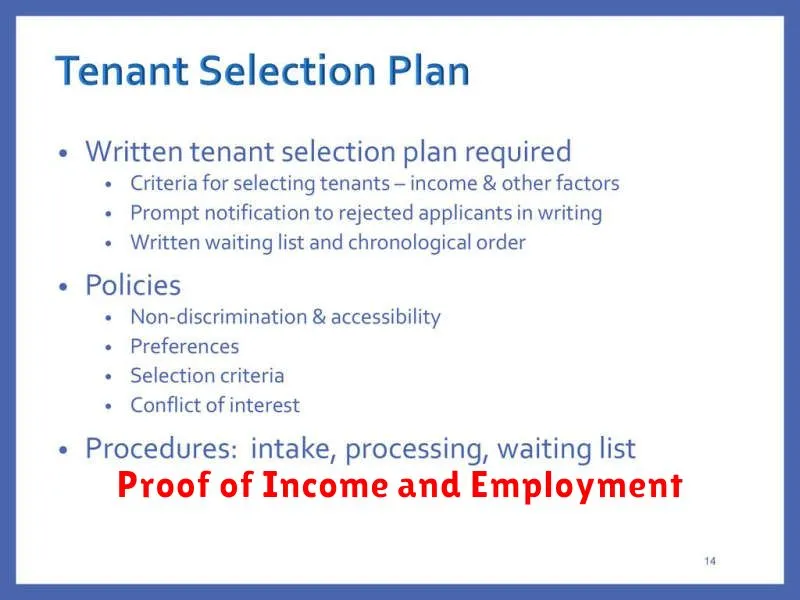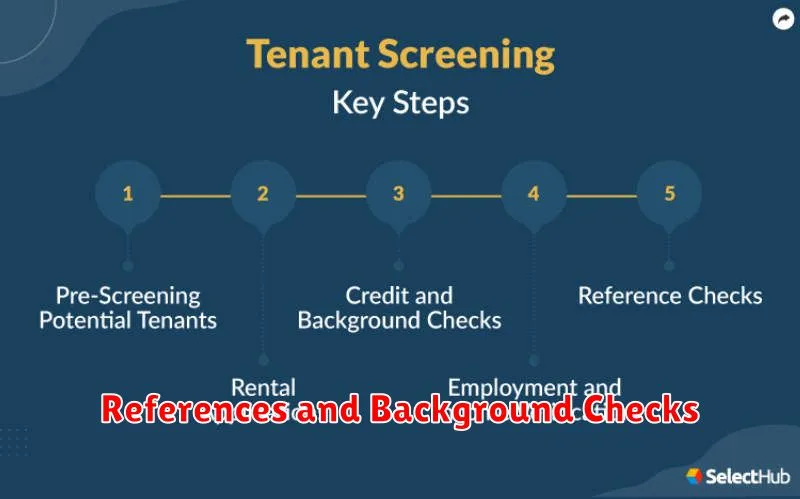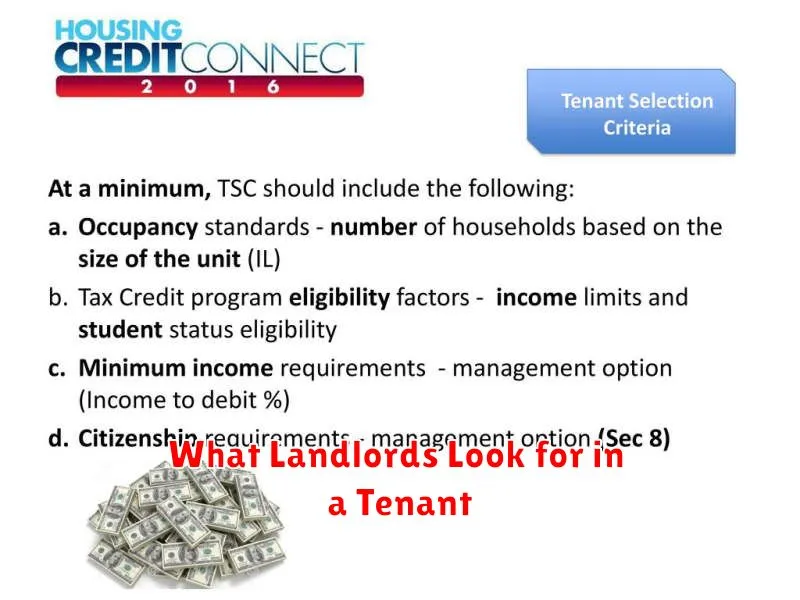Finding the right tenant is crucial for any landlord. Securing a reliable tenant can mean the difference between consistent rental income and costly vacancies, property damage, and legal headaches. This article delves into the key factors landlords look for in a tenant, helping prospective renters understand how to present themselves as the ideal candidate. We’ll explore everything from credit scores and rental history to income verification and personal references, providing you with the knowledge you need to secure your desired rental property.
Understanding what landlords seek allows prospective tenants to highlight their strengths and address any potential concerns proactively. From demonstrating financial responsibility and a history of respecting property to presenting a positive and professional demeanor, this guide will empower you to make a strong impression. Learn how to navigate the tenant screening process and showcase yourself as a responsible and desirable tenant. Whether you’re a first-time renter or a seasoned veteran, understanding these key aspects will give you a competitive edge in the rental market.
Understanding a Landlord’s Perspective
Landlords are business owners seeking to generate income from their property investments. Their primary goals include earning a consistent rental income stream, maintaining the value of their properties, and minimizing financial risks. Profitability is a key driver, influenced by factors like rental market rates, operating expenses (e.g., maintenance, taxes, insurance), and vacancy rates. Landlords must also protect their investment by mitigating risks associated with property damage and tenant defaults. Legal compliance is crucial, requiring adherence to fair housing laws, lease agreements, and local regulations.
Effective tenant management is essential for successful landlording. Finding reliable, long-term tenants reduces vacancy periods and turnover costs. Clear communication and established procedures help ensure smooth operations, from rent collection to maintenance requests. Building positive tenant relationships can foster mutual respect and contribute to a stable rental environment. While landlords aim for positive interactions, they must also be prepared to enforce lease terms and address issues that arise, such as late payments or property damage. Maintaining a balance between tenant satisfaction and protecting their investment is a constant challenge.
Landlords face various external challenges. Fluctuations in the real estate market, economic downturns, and changes in local regulations can all impact their business. Staying informed about market trends, managing finances effectively, and adapting to changing circumstances are essential for long-term success. Moreover, understanding and responding to local community dynamics and neighborhood issues is crucial for maintaining property value and fostering positive relationships with the broader community.
Credit Score and Rental History
Your credit score plays a significant role in the rental application process. Landlords use your credit score to assess your financial responsibility and predict your likelihood of paying rent on time. A higher credit score generally indicates a lower risk for landlords, increasing your chances of approval. Conversely, a lower credit score might lead to application denial or require a higher security deposit or a co-signer.
Similarly, your rental history is a critical factor. A positive rental history demonstrates a track record of responsible tenancy, including paying rent on time and maintaining the property. Landlords often contact previous landlords to verify your rental history and inquire about your behavior as a tenant. Providing references from previous landlords can strengthen your application, especially if you have a limited credit history.
While both credit score and rental history are important, some landlords may place more emphasis on one over the other. For example, if you have a limited credit history, a strong rental history with positive references can compensate. Likewise, if you have a few blemishes on your credit report but can explain the circumstances and provide proof of improved financial management, some landlords may still consider your application.
Proof of Income and Employment

Proof of income and employment verification are frequently required for various purposes, such as applying for a loan, renting an apartment, or obtaining a visa. These documents demonstrate your financial stability and ability to meet financial obligations. Commonly accepted documents include pay stubs, W-2 forms, tax returns, bank statements, and employment verification letters.
Pay stubs typically detail earnings for a specific pay period, including gross pay, deductions, and net pay. W-2 forms summarize annual earnings and taxes withheld. Tax returns offer a comprehensive overview of your financial situation. Bank statements showcase account activity and balance. Employment verification letters confirm your employment status, job title, and salary.
It’s crucial to provide accurate and up-to-date documentation when requested. Failure to do so may result in delays or rejection of your application. Contact your employer or financial institution for assistance if you have difficulty obtaining the necessary documentation.
References and Background Checks

References and background checks are crucial steps in the hiring process. They provide valuable insights into a candidate’s past performance, work ethic, and overall suitability for a position. By contacting listed references, employers can gain a deeper understanding of a candidate’s skills and experience beyond what is presented on a resume or in an interview. This information can help employers make informed decisions and choose the best candidate for the job.
Background checks typically involve verifying information provided by the candidate, such as education and employment history. They may also include criminal record checks and credit reports, depending on the nature of the position and industry regulations. These checks are essential for mitigating risk and ensuring a safe and secure work environment. It is important for employers to comply with all applicable laws and regulations related to background checks and to obtain the candidate’s consent before conducting any checks.
The information obtained through references and background checks should be carefully evaluated and considered in conjunction with other factors, such as interview performance and skills assessments. A comprehensive approach to candidate evaluation ensures a fair and objective hiring process.
Cleanliness and Responsibility

Cleanliness is essential for maintaining a healthy and pleasant environment. It involves keeping ourselves and our surroundings free from dirt, germs, and unwanted substances. This contributes to both physical and mental well-being, reducing the risk of illness and promoting a sense of order and calm.
Responsibility for cleanliness extends to both personal and shared spaces. We are responsible for maintaining our personal hygiene, keeping our belongings tidy, and cleaning up after ourselves. In shared spaces, like homes, workplaces, and public areas, collective responsibility is crucial for creating a clean and comfortable environment for everyone.
Practicing cleanliness demonstrates respect for ourselves, others, and the environment. By taking responsibility for cleanliness, we contribute to a healthier, more enjoyable, and more sustainable world. Simple actions like proper handwashing, regular cleaning routines, and conscious waste disposal make a significant difference.
Communication and Respect
Effective communication is crucial for building and maintaining respectful relationships. This involves clearly conveying your message while also actively listening to and acknowledging the perspectives of others. Open dialogue, where individuals feel comfortable sharing their thoughts and feelings without fear of judgment, fosters mutual understanding and strengthens bonds.
Respect is demonstrated through both verbal and non-verbal communication. Using polite language, maintaining eye contact, and actively listening demonstrate attentiveness and value for the other person. Avoiding interrupting, dismissive language, and condescending tones are equally important aspects of respectful communication.
Cultivating a respectful communication style requires empathy and a genuine desire to understand others’ viewpoints, even when disagreements arise. By prioritizing respectful communication, we create an environment of trust, collaboration, and mutual respect.
How to Make a Great First Impression
Making a strong first impression is crucial in both personal and professional settings. It sets the tone for future interactions and can significantly impact how others perceive you. Be punctual and prepared, demonstrating respect for others’ time and your own commitment. Dress appropriately for the occasion, conveying professionalism and attention to detail. Maintain positive body language by standing tall, smiling genuinely, and making eye contact. These simple actions project confidence and approachability.
Effective communication is key to a positive first impression. Listen attentively to others, showing genuine interest in what they have to say. Speak clearly and confidently, avoiding jargon or overly complex language. Ask thoughtful questions and engage in meaningful conversation. Remember to be polite and respectful, even when disagreeing. By focusing on clear and respectful communication, you can create a strong connection and establish rapport.
Finally, remember the importance of authenticity and follow-up. Be yourself and let your genuine personality shine through. People are drawn to authenticity and appreciate honesty. After the initial interaction, follow up with a brief email or note to express your gratitude and reiterate your interest. This demonstrates professionalism and strengthens the initial connection, solidifying a positive first impression.

